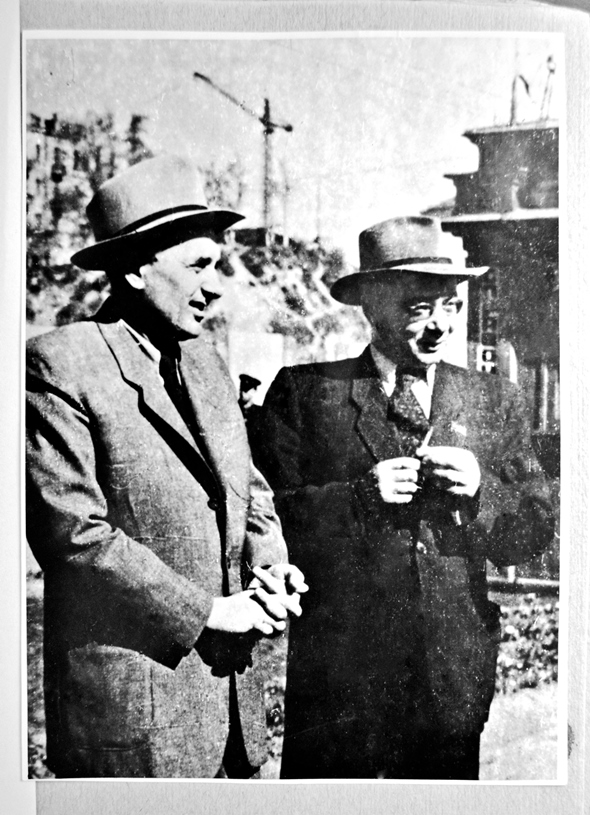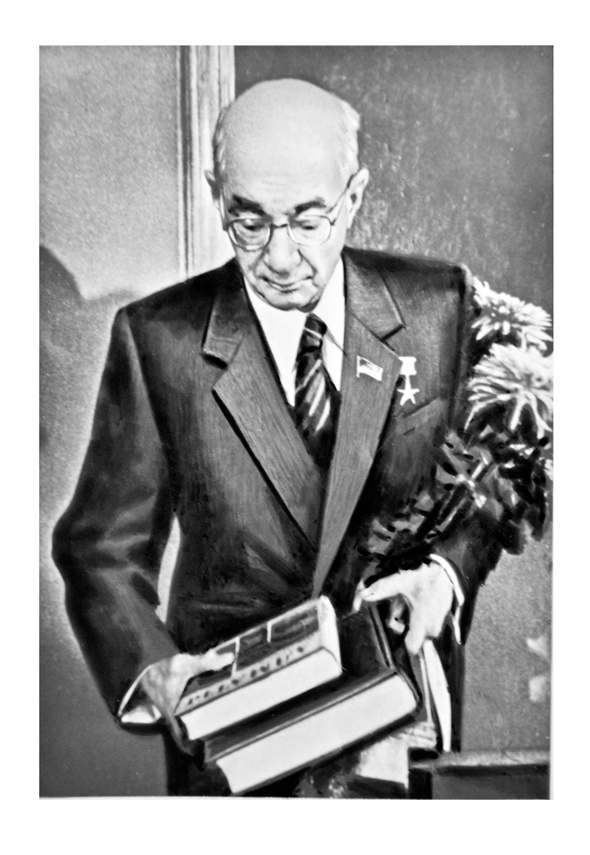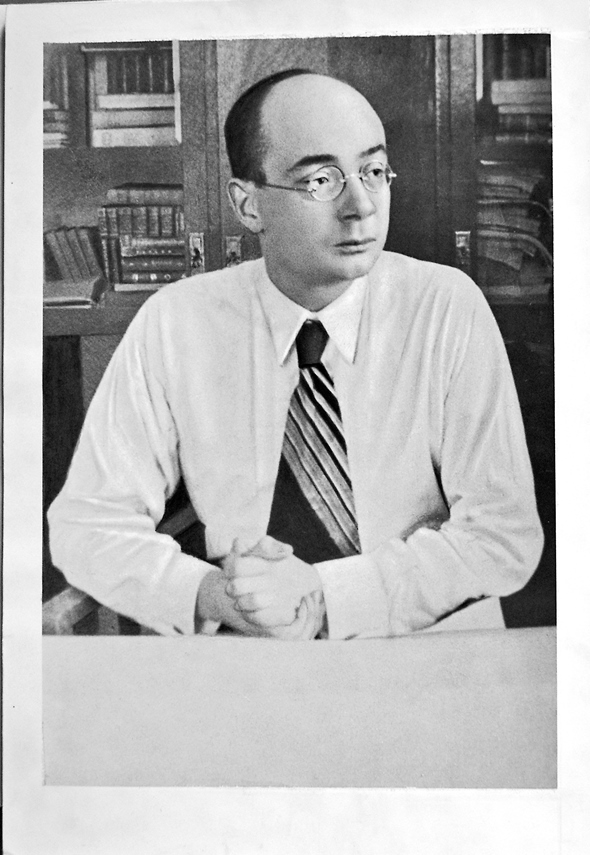useless french, indeed
En parlant de Juifs oukraïniens, des Juifs et des Oukraïniens, de antisémitisme traditionnel des Oukraïnines et tout ça. Va paraître dans les jours qui viennent "Quiet Spiders of the Hidden Soul".
On peut parler d’un miracle : Bajan, Sossioura, Rylsky, Zerov, le génial Tytchyna... peu de littératures européennes peuvent se vanter d’avoir fait surgir une telle pléiade de grands poètes en un laps de temps aussi bref.
 |
| Youry Yanovsky et Mykola Bajan deux survivants de la Renaissance fusillée |
On peut parler d’un miracle : Bajan, Sossioura, Rylsky, Zerov, le génial Tytchyna... peu de littératures européennes peuvent se vanter d’avoir fait surgir une telle pléiade de grands poètes en un laps de temps aussi bref.
Piotr Rawicz, 1981
“Quiet Spiders of the Hidden Soul”
Mykola (Nik) Bazhan’s Early Experimental Poetry
This bilingual Ukrainian-English collection brings together the most
interesting experimental works by Mykola (Nik) Bazhan, one of the major
Ukrainian poets of the twentieth century. As he moved from futurism to
neoclassicism, symbolism to socialist realism, Bazhan consistently
displayed a creative approach to theme, versification, and vocabulary.
Many poems from his three remarkable early collections (1926, 1927, and
1929) remain unknown to readers, both in Ukraine and the West. Because
Bazhan was later forced into the straitjacket of officially sanctioned
socialist realism, his early poetry has been neglected. This collection
makes these outstanding works available for the first time
Table of Contents
Preface
Oksana RosenblumIntroduction: “The Ukrainian Avant-Garde and Its Roots: The Poetics of Mykola (Nik) Bazhan”
Galyna BabakCOLLECTIONSСімнадцятий патруль/The Seventeenth Patrol (1926)Translator’s Essay: “Jumping the Corral Fence”
Svetlana LavochkinaПісня бійця / Trooper’s Song
Імобе з Галаму / Imobe of GalamРізьблена тінь/The Sculpted Shadow (1927)Translator’s Essay: “Mykola Bazhan’s The Sculpted Shadow: Echoes of Acmeism”
Dr. Amelia GlaserОсіння путь / An Autumn Road
Підкови коней / Horseshoes
Нічний момент / A Moment in the Night
Неясний звук / Indistinct Sound
Папороть / Fern
Кров полонянок / The Blood of the Captive Women
Любисток / Lovage
Розмай-зілля / Love Potion
Дорога несходима / The Infinite RoadБудівлі/Edifices (1929)Дорога / The Road
Нічний рейс / A Night Cruise
Моєму другові / To My Friend
Фокстрот / Foxtrot
Елегія атракціонів / Elegy for Circus Attractions
Будівлі / Edifices: Собор / Cathedral, Брама / Archway, Будинок / Building
Розмова сердець / Conversation of HeartsShort Poems (1923-1927)Translators’ Essays
Ostap Kin, Ainsley Morse, Mykyta Tyshchenko
Seán MonagleСурма юрм / Trumpet of Swarm
Рура-Марш / Ruhr-March
Аеро-марш / Aero-March
Мене зелених ніг / Hops of Green Legs
Цирк / CircusLong Poems (1929-1930)Гофманова ніч / Night of Hoffmann
Гетто в Умані / Ghetto in Uman’Translator’s Essay
Prof. George G. GrabowiczСліпці / Blind BardsProse (1927)Translator’s Essay
Dr. Roman IvashkivЗустріч на перехресній станції: розмова трьох / Meeting at the Crossroad Station: A Conversation Among the Three (1927)Afterward: “From the Whirlpool of Creativity to Living on the Edge of a Psychological Abyss: Mykola Bazhan in the 1920s and 1930s”
Dr. Eleonora Solovey
Information about the editors, translators, and contributing writers
Illustrations
Index
Edited by Oksana Rosenblum, Lev Fridman, and Anzhelika Khyzhnya
Series: Ukrainian Studies
ISBN: 9781644693940 (hardcover), 9781644693957 (paperback)
Pages: approx. 280 pp.; 8 illus.
Publication Date: September 2020


 |
| Mykola Bajan, 1904-1983 |
Mykola Bazhan (1904–1983), one of the most important
representatives of Ukrainian literary renaissance of the 1920s, was born
into an educated family of Polish-Lithuanian roots in
Kamyanets’-Podil’s’kyi in Ukraine. Bazhan emerged as a futurist;
however, in the 1920s and early 1930s he embraced romantic
Expressionism, with frequent references to the turbulence of Ukrainian
history. During his extensive career spanning some six decades, Bazhan
was prolific as a poet, literary critic, translator, editor, art
collector, and a political and cultural figure. Despite the fact that
Bazhan not only survived the purges but eventually became an influential
political figure, his early works continued to be repressed until the
early 1990s.
* * *
En français l’œuvre de Mykola Bajan est accessible grâce à deux traductions de ses poésies. "Le Forum romain", parfaitement soviétique, "marrane", traduite par Léon Martirossian [trd. 1963, 'dégel khrouchtchevien']. Parue à Moscou dans "Oeuvres et Opinions", une revue de propagande. Bon. Et une autre, apparemment fait exprès pour l'Anthologie de la littérature ujkrainienne du XIe au XXe siècle (Anthologie sable 2004, 1002 p.), Le pré est béni par la neige, par Marie Venhrénivska :
Le pré est béni par la neige -
Dont les flocons dansent dans l'air, -
Et je me tais, comme je lis un livre
De secrets grands, doux et câlins,
Dans le soir enivrant et lent
Le sortilège du coeur. Oh ma tendresse douce !
Des oiseaux pourprés en feu d'artifice
Percent l'argenté firmament.
Je marche et me tais, et rêve de mes songes,
Et je fonds sur les paumes du silence, -
Cristal créé des mains saintes
Pour mon bonheur et mon chagrin.
Rêveur et somnolent je vais rôder sans but,
J'entrerai dans mon songe et je n'en sortirai plus,
Et tout silencieux je viendrai jusqu'au bout
Par le silence blanc, bon et éternel.
[trd. 2004, glorieuse Révolution orange]


Aucun commentaire:
Enregistrer un commentaire